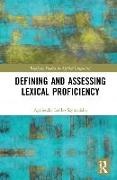Read more
Informationen zum Autor Agnieszka Lenko-Szymanska is Assistant Professor at the Institute of Applied Linguistics at the University of Warsaw! Poland. Zusammenfassung This comprehensive account of performance-based assessment of L2 lexical proficiency analyzes and compares two of the primary methods of evaluation used in the field and unpacks the ways in which they tap into different dimensions of one model of lexical competence and proficiency. Inhaltsverzeichnis Table of contents Introduction Chapter 1: Lexical competence and lexical proficiency 1.1. Introduction 1.2. Preliminary definitions 1.2.1. Communicative competence, language ability and language proficiency 1.2.2. Cognitive linguistic models of language 1.2.3. Aspects of language proficiency 1.3.4. Approaches to the description of lexical competence 1.3. Word-centred approaches to the description of lexical competence 1.3.1. Components of word knowledge 1.3.2. Degrees of word knowledge 1.4. Lexicon-centred approaches to the description of lexical competence 1.5. Lexical competence vs. lexical proficiency 1.6. Lexical competence, lexical proficiency and phraseology 1.7. Conclusion Chapter 2: Lexical assessment methods 2.1. Introduction 2.2. Definition and qualities of a language test 2.3. Tasks assessing lexical proficiency 2.4. Task formats 2.4.1. Discrete-point tasks 2.4.2. Integrative tasks 2.4.3. Communicative tasks 2.5. Vocabulary tests 2.5.1. Vocabulary testing for educational purposes 2.5.2. Vocabulary testing for research purposes 2.6. Conclusion Chapter 3: Performance-based assessment of lexical proficiency 3.1. Introduction 3.2. Performance assessment 3.3. The process of writing assessment 3.3.1. Instrument 3.3.2. Raters 3.3.3. Scales 3.4. Vocabulary in writing assessment scales in education 3.4.1. Holistic scales 3.4.2. Analytic scales 3.5. Analytic scales for the assessment of vocabulary in education 3.6. Vocabulary assessment scales for research purposes 3.7. Extraneous variables in the assessment process 3.7.1. Influence of the tasks 3.7.2. Influence of the scales 3.7.3. Influence of the raters 3.8. Conclusion Chapter 4: Statistical measures of lexical proficiency 4.1. Introduction 4.2. Lexical measures of fluency and measures of lexical productivity 4.3. Measures of lexical accuracy 4.4. Measures of lexical complexity 4.4.1. Lexical diversity (variation) 4.4.2. Lexical sophistication 4.4.3. Older measures: Lexical density and lexical originality 4.4.4. More recent measures: Word psychological properties and semantic relations 4.4.5 Phraseological measures 4.5. Conclusion Chapter 5: Statistical measures and raters' scores of L2 production – review of literature 5.1. Introduction 5.2. Lexical measures for discriminating between different proficiency levels 5.3. Lexical measures vs. raters’ scores 5.3.1. Correlational studies 5.3.2. Regression studies 5.3.3. Analytic scores of lexical proficiency 5.4. Conclusion Chapter 6: The study – measuring and assessing lexical proficiency of advanced learners 6.1. Introduction 6.2. Research questions 6.3. Subjects and instruments 6.3.1. Essays 6.3.2. Vocabulary tests 6.4. Data 6.4.1. Lexical indices 6.4.2. Raters’ grades 6.4.3. Vocabulary test scores 6.4.4. Interviews 6.5. Data analysis 6.5.1. Analysis 1 – relationships between the indices 6.5.2. Analysis 2 – comparison of the indices between the groups 6.5.3. Analysis 3 – prediction of group membership based on selected indices 6.5.4. Analyses 4 and 5 – relatio...

